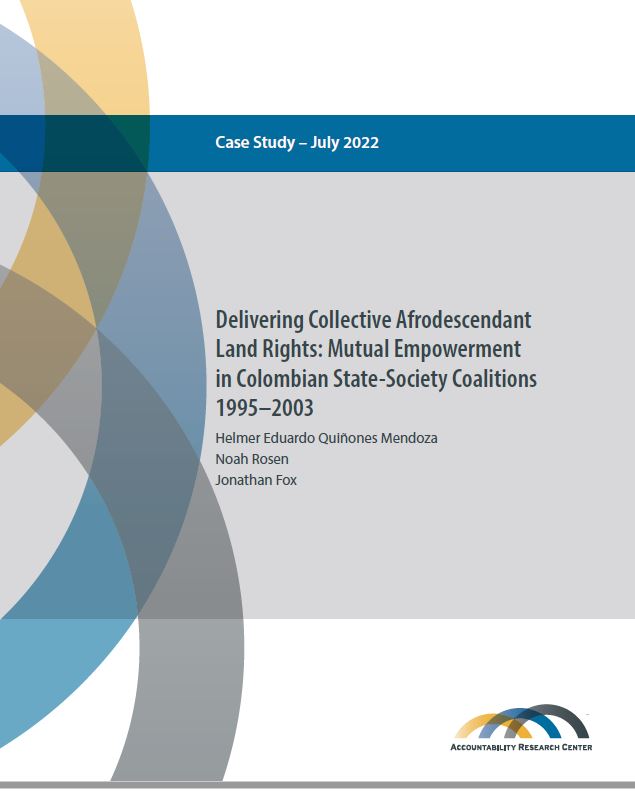
Delivering Collective Afrodescendant Land Rights: Mutual Empowerment in Colombian State-Society Coalitions 1995-2003
Date: July 2022
Author(s): Helmer Quiñones, Noah Rosen, Jonathan Fox
Publication type: Case study
Published by: Accountability Research Center
Leer en español.
“Sandwich strategies” are interactive processes in which reformers in government take tangible measures that reduce the risks of citizen action from below, driving virtuous circles of mutual empowerment between pro-accountability actors in state and society. This case study is one of a set of 18 published here, which are among those included in comparative analyses of whether and how sandwich strategy initiatives drive institutional change.
Colombia’s 1991 constitution created a democratic opening that led, in 1993, to Law 70. This law recognized a series of Afrocolombian rights, including the right to ethnic territories on the Pacific coast. From 1996 through 2003, Black activists from both civil society and the state sought to maximize this brief, unique window of opportunity to advance territorial rights.
Grassroots organizing and advocacy campaigning in the region included the formation of the ethnoterritorial organizations required by law to petition for collective land titles. Large-scale infrastructure projects were blocked. Community-based advocacy organizations, together with reformist government staff and technical advisors from universities, documented the ethno-historical land claims needed to formalize titling, which covered half of the region. Support from insider allies in the World Bank supported the ethnic land rights policy, funded the consultations, and then helped to offset bureaucratic obstacles.
At the same time, the civil war brought violent displacement to the region. Nonetheless, between 1996 and mid-2003, the Colombian government demarcated five million hectares, titling 122 black territories to councils that represented 270,000 people. In spite of repression of grassroots leaders in the region, the 210 community land councils survive, with permanent rights over millions of acres of the Colombian Pacific.
Noah Rosen’s research examines the intersection between social justice activism and peace processes in order to expand our understanding of just war-to-peace transitions. His PhD discussed how locally-based collective mobilization influences the outcomes of national-level inclusion mechanisms in the 2016 Colombian peace accord. He is involved in housing justice campaigns in Washington, DC and hopes to continue to build mutually enriching connections between scholarly and activist communities.
Helmer Quiñones is an Afro-descendant philosopher who studied in the Institute of Political Studies and International Relations of the National University of Colombia. Since 2005, his professional work has focused on democratization processes, institutional design, development planning, human rights, and international humanitarian law, including the field of transitional justice. Since its institutionalization in December 2016, he has coordinated the advisory team of the High-Level Forum with Ethnic Peoples (IEANPE) of the CSIVI, the main mechanism for monitoring and promoting the Ethnic Chapter of the Peace Agreement. He has also worked closely with the National Afro-Colombian Peace Council (CONPA) and its member organizations, including the Interethnic Solidarity Forum for Chocó (FISCH). Since 2018, he has been part of the research team of the Accountability Research Center in the process of monitoring the implementation of the Plan Todos Somos Pazcífico (2016–2022), a Colombian government initiative to close the gap in access to basic services for the excluded Afro-descendant population in the Colombian Pacific region. His work supports communities on the ground, including social oversight initiatives in Tumaco, Quibdó, and Buenaventura.
Jonanthan Fox is Jonathan Fox is Professor of Development Studies in the School of International Service at American University in Washington DC, where he directs the Accountability Research Center. He works with diverse civil society organizations, as well as national and international policymakers, to analyze initiatives that promote participation, transparency, and accountability. Many of his publications are accessible at: www.jonathan-fox.org.
